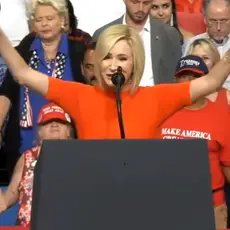The Trump administration put on a show of force at an event that was scheduled in competition with a United Nations summit on climate change: President Donald Trump, Vice President Mike Pence, Secretary of State Mike Pompeo, and U.S. Ambassador to the United Nations Kelly Craft all took seats next to U.N. Secretary General António Guterres for what was billed as a "Global Call to Protect Religious Freedom."
Plenty of Trump’s religious right allies were present for his speech. Trump mentioned by name Franklin Graham and Paula White—the latter a prosperity gospel huckster who serves as Trump’s “spiritual adviser.” Others who mentioned online that they would be in attendance included Dallas pastor Robert Jeffress, anti-gay activist Jim Garlow, and Gary Bauer. Jeffress was on “Fox and Friends” this morning to praise Trump for skipping the climate change summit, calling climate change “an imaginary problem.” In a tweet promoting his interview, Jeffress dismissed “the climate change hoax.” (Trump reportedly did a brief drop-in on his way to the religious liberty event.)
At the U.N., Craft introduced Pence, who touted administration efforts, including the establishment of an international freedom fund, which he said had given more than 435 rapid-response grants to assist victims of religious persecution.
Pence introduced Trump with his trademark sycophancy, saying that introducing Trump is always a high honor, and that being at the UN with Trump for today’s event was among the greatest honors he’s ever had.
Religious persecution is a very real problem. A huge percentage of the world’s population lives in places where people face sometimes brutal repression and deadly violence for their religious beliefs. The U.S. promotes religious freedom through its Ambassador at Large for International Religious Freedom, the U.S. Commission on International Religious Freedom, and the State Department’s annual report to Congress on international religious freedom, which is compiled in compliance with the International Religious Freedom Act of 1998. During the Trump administration, Pompeo has hosted two high-level “ministerial” gatherings to promote religious freedom.
To their credit, Trump and Pence emphasized that people of many faiths face persecution, and that people of all faiths deserve freedom to live according to their own faith.
But even when addressing an important issue on which there is widespread nonpartisan support for U.S. leadership, Trump managed to bring the event down to his political level with some typically Trumpish flourishes.
Trump couldn’t resist patting himself on the back for addressing the issue at the U.N. and saying it was “very sad” that other presidents hadn’t done so. He also couldn’t resist taking a shot at the Obama administration; while introducing pastor Andrew Brunson, who was freed from Turkish custody after lobbying by the Trump administration, Trump said of the Obama administration, “I don’t think they tried too hard, unfortunately” to win Brunson’s release.
And Trump took a play out of the religious right’s playbook by seemingly equating U.S. regulations on electoral politicking by churches, and nondiscrimination ordinances with the kind of brutal repression that religious minorities face around the globe. Early in his remarks, Trump boasted that he had “obliterated” the Johnson Amendment. In reality, that restriction on churches and other tax-exempt nonprofits engaging in electoral politics is still on the books, but Trump has by executive order discouraged its enforcement.
Trump also announced a new fund to protect religious relics and sites and a new initiative that he said would be carried out by a coalition of U.S. business leaders to protect religious freedom in the workplace.
While there are ongoing legal and political struggles in the U.S. over conflicts that arise when constitutional principles like religious liberty and equality under law come into tension around policy matters, it is frankly offensive to equate, even indirectly, those disagreements with the deadly persecution that so many religious minorities face around the world.
And some people who share the goal of a world in which religious freedom is more secure find it hard to accept Trump as deliverer of that message. Rabbi Jack Moline, president of the Interfaith Alliance, responded to Trump’s speech this way:
President Trump was elected on the promise of a 'complete and utter shutdown' of Muslim immigration to the U.S. Since then, his administration has worked tirelessly to redefine "religious freedom" as a license to discriminate. If the president is serious about promoting true religious freedom worldwide, he should start with his own policies.
On that front, Trump also talked at the U.N. about meeting at the White House with survivors of religious persecution. Noting that some of them were present, Trump said, “America will always be a voice for victims of religious persecution, everywhere. No matter where you go, you have a place in the United States of America.” But in reality, the Trump administration has severely reduced the number of refugees accepted into the United States, and is reportedly considering eliminating refugee admissions altogether. The plans are so draconian that even some of Trump’s most reliable allies have urged him to reconsider. Earlier this month, the group Refugees International gave the Trump administration an F grade for its performance on refugee and humanitarian protection.







